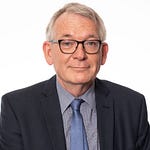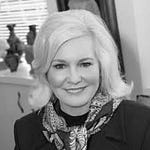❝ Debt is rising. It’s not sustainable. A change needs to happen. What’s less certain is when we need to make that change. Personally, I would get started now and start chipping away at it, making it better with each step rather than worse with each step.
Welcome to the 62nd episode of The Hale Report. My name is Lyric Hughes Hale, and I am Editor-in-Chief of econVue. My guest today is Jason Furman for a conversation on economic policy and resilience.
Professor Furman is the Aetna Professor of the Practice of Economic Policy jointly at Harvard Kennedy School (HKS) and the Department of Economics at Harvard University. He co-teaches the largest course at Harvard, basically Econ 101. From 2013 to 2017 Furman was the Chair of the Council of Economic Advisers (CEA) under President Obama. In this podcast he does an excellent job of explaining key economic terms and concepts as he shares his past experiences in government and his current policy views.
We discussed a wide range of topics just prior to the election on the day of a disappointing October jobs report. In spite of robust employment numbers, inflation played a key role in US voters’ decisions. He gives a very clear explanation of the Fed’s dual mandate, saying that all central banks worry about both prices and employment.
When I asked which economist he would most like to have dinner with, Furman said John Maynard Keynes, which tells you a lot about his flexible intellectual framework.
In this podcast, you can clearly hear Furman’s focus on inclusive growth, and you will have no doubt why he is one of the most popular professors at Harvard. He takes the complex and makes it understandable, and he doesn’t let his devotion to numbers overshadow his concerns about the effects of economic policy on ordinary people:
A prolific user of X (formerly Twitter), Furman frequently shares his insights on economic issues. Follow him on @jasonfurman.
Topics Discussed
The Sahm Rule
The future of work & AI
Consumer debt
Economic inequality and mobility
The Federal Reserve’s dual mandate
Gold and crypto
Equity valuations
Healthcare reform
Global markets
Key Moments
❝ John Maynard Keynes is the most fascinating economist. Part of why he was fascinating is that he didn’t form a fixed view and stick to it; he changed his mind based on new understanding and new problems.
❝ The third round (of stimulus checks) wasn’t necessary and did contribute to inflation, though other factors were also at play. By early 2021, employment and the economy were recovering well, so the decision was more political than economic.
❝ For emerging markets, (gold) is a diversification away from the dollar due to concerns about its stability, especially after U.S. actions like freezing Russian reserves.
Referenced in this Podcast
The General Theory of Employment, Interest, and Money, John Maynard Keynes, 1936.
Starting health reform from here, Jason Furman, Journal of Policy Analysis and Management Apr 30, 2024.
Why Did (Almost) No One See the Inflation Coming? Jason Furman, Intereconomics 57 2022: 79-86.
Review of The Resilient Society, by Markus K. Brunnermeier, Jason Furman, Journal of Economic Literature, 62.3, September 2024: 1258-1259.
Many thanks to Prof Furman, and to all the people behind the scenes who make econVue possible, especially our producer, Sam Fu.
If you’d like to subscribe to our newsletter and listen to more podcasts, please visit our website at econVue.com and if possible, support us on Substack.
.
📍Chicago















